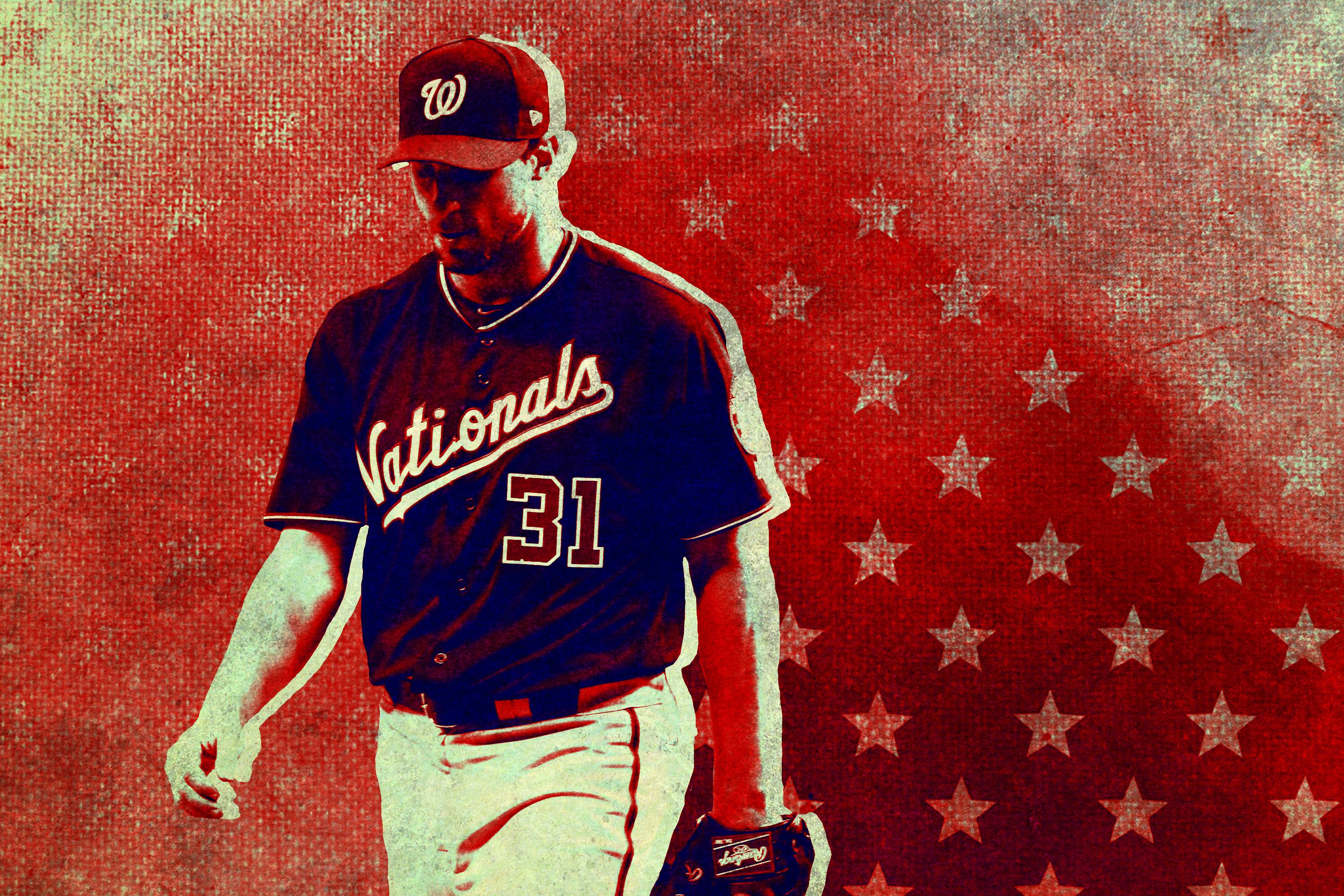
On June 18, Nationals right-hander Max Scherzer was taking a few practice bunts before a game when he accidentally redirected a ball back into his own face.
The foul bunt broke Scherzer’s nose and left the most famous American with heterochromia iridum with a hideous black eye to accent his contrasting irises. The next night, the three-time Cy Young winner made his start as scheduled and threw 117 pitches over seven scoreless innings and struck out 10 Phillies along the way.
So when Scherzer had to be scratched from his start in Game 5 of the World Series, citing muscle spasms in his neck, consider the level of pain Scherzer is willing to pitch through. The spasms had come and gone for a few days, Scherzer said, and he thought he’d found a way to pitch through it, but by Sunday morning, he was so stiff he couldn’t even dress himself.
“I’ve pitched through so much crap in my career that that would be easy to pitch through at this point,” Scherzer said at a pregame press conference Sunday afternoon. “This is literally impossible to do anything with.”
Scherzer’s understudy, Joe Ross, pitched fairly well in Game 5, all things considered, but the chorus of “Let’s go, Joe!” chants that echoed around Nationals Park as he pitched came more in hope than in expectation. Ross allowed a pair of two-run home runs and did not challenge Astros starter Gerrit Cole the way a healthy Scherzer might have.
After taking a 2-0 series lead in Houston, the Nationals looked poised to pull off a historic upset. Instead, they’ve dropped all three home games and teeter on the verge of elimination. The Nationals now need to win both of the next two games, both in Houston, against Cy Young winners Justin Verlander and Zack Greinke. Otherwise the Astros will take home their second title in three years.
On Sunday morning, Scherzer received a cortisone shot, which could enable him to take the mound for a hypothetical Game 7; he says he won’t know for sure whether it worked until Tuesday at the earliest. Scherzer’s injury didn’t just force Ross into a spot start, it made Nationals manager Dave Martinez tweak his rotation for the rest of the series. How might he approach these next two games?
It’s worth pointing out right off the proverbial bat that none of this is going to matter if the Nationals don’t remember how to hit. Washington scored 10 runs in the last three innings of Game 2 and three runs in 27 innings since. The Nats managed just a single solo home run off Cole in Game 5, which might have condemned them to lose even if Scherzer had been able to pitch.
Stephen Strasburg’s performance in Game 6 will be just as important as the offensive output. With Verlander on the mound and key members of Houston’s lineup—Alex Bregman and Yordan Álvarez in particular—seemingly having woken up from brief slumps, there is no realistic path to victory for Washington that does not involve Strasburg pitching well in Game 6. Strasburg has already outpitched Verlander once this series, going six innings and allowing two runs in a Game 2 win; in fact, the Nationals haven’t lost a playoff game Strasburg’s appeared in since Game 1 of the 2017 NLDS.
But if the Nationals can stay alive through the end of Strasburg’s stint, they’re actually not in terrible shape from a pitching perspective.
Washington’s pitching has faltered this World Series when Martinez has seemingly been saving his best pitchers for other, more important innings that never seem to materialize: Aníbal Sánchez allowed two runs when Martinez left him in too long in Game 3. In Game 4, the Nationals trailed essentially from pillar to post, but they were still within striking distance until Fernando Rodney—not relief aces Sean Doolittle or Daniel Hudson—allowed Bregman to put it out of reach with a seventh-inning grand slam.
The contrast was made all the more stark by the previous half-inning, when Houston manager A.J. Hinch called on Will Harris, his best reliever, to put out a fire in the sixth inning. Juan Soto came up with the bases loaded and one out, representing the tying run, but Harris squeezed out of the jam with Houston’s lead intact.
But with no more margin for error, Martinez will be forced to use his best pitchers more aggressively. The good news is, because—just to use one example—Javy Guerra has pitched twice in this series, those best pitchers are well rested. Both Doolittle and Hudson pitched in Game 5, with Hudson taking a bit of a beating to the tune of three runs and 36 pitches, but both will be available for Game 6 after the Monday off day. Moreover, both made their Sunday appearances on four days’ rest, as neither had pitched since Game 1.
If Strasburg gets through six or seven innings and the game doesn’t go to extra innings, Martinez should be able to close it out using only his two best relievers in fairly routine short stints.
If Scherzer is ready to pitch in a theoretical Game 7, he’ll have an advantage over Greinke, who hasn’t looked like himself this entire postseason. If not, Martinez could call on either Sánchez on full rest or Game 4 starter Patrick Corbin on three days’ rest, or have each pitch a shorter stint before handing things off to the bullpen. In the event Scherzer does start Game 7, Corbin would be a logical choice to serve as a middle-inning bridge to Doolittle and Hudson, as he did when Scherzer could go only five innings in Game 1.
But all of that is contingent upon Strasburg and the Nationals offense extending the series long enough for Scherzer to have a chance to play a further part in it. Otherwise, Washington’s victory parade won’t get out of the chiropractor’s waiting room.